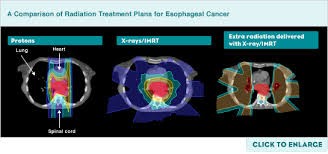October 19, 2015 – Proton beam therapy (PBT) and intensity modulated radiation therapy (IMRT) used to treat esophageal cancer reduced postoperative complications (POCs) and length of hospitalization stay (LOS) compared to 3D conformal RT (3D), according to a recent study.1
The researchers retrospectively reviewed outcomes of 582 patients treated at three academic institutions with neoadjuvant chemoradiation and surgery from 2007-2013. The majority of surgeries (98%) were open thoracotomy procedures, with the most common being Ivor-Lewis (84%). Thirty-seven percent of patients (n=215, 37%) were treated with 3D, 44% with IMRT, and 19% with PBT. Researchers assessed associations between radiation modality and pulmonary, GI, cardiac, wound healing complications, and 90-day postoperative mortality using Chi-Square test and used the Kruskal-Wallis test to compare LOS among the RT modalities.

The surgical approach did not predict any complications. However, the modalities, PBT, IMRT and 3D RT, were significantly associated with the incidence of pulmonary complications, cardiac complications and wound complications. The RT modality was also a significant predictor for all three toxicities.
The researchers also found a significant correlation in the LOS with RT modality, with a mean hospital stay of for 3D 13.2 versus IMRT with 11.6 days and PBT with 9.3 days.
References:
1. SH Lin, KW Merrell, N Bhooshan, et al. Radiation modality use and the incidence of postoperative complications and length of hospitalization after trimodality therapy for esophageal cancer: A multi-institutional analysis. Presented at 57th Annual Meeting of the American Society for Radiation Oncology (ASTRO). October 18, 2015. San Antonio, Texas.




